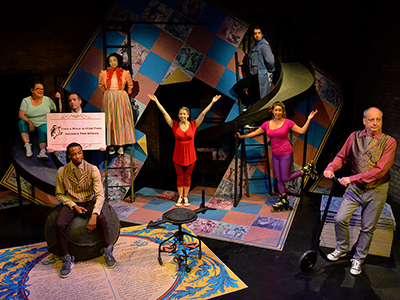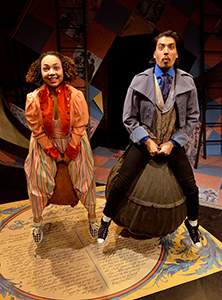From Newcity
A Royal Delight: A Review of Sylvester at Lifeline Theatre
September 24, 2017
By Aaron Hunt
RECOMMENDED
The matriarch of the Regency romance novel Georgette Heyer borrowed loquaciously from Jane Austen and then threw in a little bodice-ripping Errol Flynn-on the high seas. If some critics accused Heyer of wallowing in over-lengthy exposition, the much-heralded Lifeline ensemble member Christina Calvit’s adaptation cuts through the minutiae to create a universal story, sailing on a whirlwind course.
Calvit’s frequent collaborator and Lifeline artistic director Dorothy Milne invites an ensemble of eight actors essaying many different roles to play a theatrical game of Chutes and Ladders, with the understanding that one cannot win the game of life and love without first spinning the wheel of chance. And play they do, changing in and out of costume designer Rachel Sypniewski’s quick-change clothes, climbing up the ladders and whizzing down the slides of Alan Donahue’s brilliantly whimsical set and somehow landing every moment on a beat.
Comic bits and heartfelt musings are timed to sound cues, which means this highly entertaining game is choreographed within an inch of its giddy life and yet the actors traipse through as though every intention sparks at the moment of understanding, metronome married to passion. The cast of Katie McLean Hainsworth, Terry Bell, Andrés Enriquez, Kate Hildreth, Kristina Loy, Samantha Newcomb, Wesley Scott and Sean Sinitski projected pure joy, kids in a British candy store. Newcomb was just right as a young woman demanding her agency in a frowning time, slowly melting into the now loving quietness of Enriquez’s equally compelling portrait of a gentleman grown stoic in answer to life’s stones, slowly opening to the love of a woman who would insist upon being his equal. And both are Bugs Bunny funny.
I’ve spent my summer gorging on the theatrical gifts of such companies as American Players Theatre, Door Shakespeare and Peninsula Players but this offering gave me greater pleasure. If “Sylvester” is a portent of the type of theater Chicago will enjoy in the upcoming season, I may so forget myself as to whistle in public.
From Chicago Theatre Review
That Hurly Burly Girl
September 25, 2017
By Ben Kemper
HIGHLY RECOMMENDED
The marriage game. Jane Austen wrote of its rules and pitfalls, so did Hardy, and so did Georgette Heyer, whose tale of mismatched persons, fantastic plots, and missteps of station give us the fun and frolicsome Sylvester or The Wicked Uncle. Sylvester Rayne Duke of Salford (Andrés Enriquez) a proud rich man with fascinating eyebrows stands aloof from the world, with a chill in his manner and a stick up his rear. Phoebe Marlow (Samantha Newcomb), aspiring authoress, is held in contempt by the world for being too plain, too outspoken, and too apt to tear away across the moors on horseback. The machinations of their elders throw these young persons together, much to their dismay. But an affinity and a shared sense of humor begin to draw them together, despite various impediments, most glaring is that the villain of Phoebe’s first novel bears a striking resemblance to the man she’s falling in love with.
In Dorothy Milne’s imaging of Christina Calvit’s sprightly adaptation the whole of the plot is played across a giant board of snakes and ladders, to mirror the characters standings in stature. It sounds like the gimmickiest gimmick of all the gimmicks but it works. Less the hight differences than the stack of giant monopoly cards that serves as humorous under narrative. But more than Alan Donahue’s beautiful board set and childish prosperities (including giant bouncy balls as stands in for horses, an undeniable stroke of utter brilliance) it is the playfulness of the ensemble, acting like the prongs and obstacles of a pinball game, bouncing our heroes all around. Kristina Loy (Alice a sprightly maid and Lady Inathe, Sylvester’s insipid sister in law, among others) never fails to let out a “whee!” when she goes down the slide or grin when she zips by on roller skates, and Katie McLean Hainsworth throws herself into playing a duchess a child or a dog with a serious twinkle.
The principal problem is a slow start and molasses thick accents that often obscure speech more than inform character. But by the time Sylvester and Phoebe are snowed in at a rural inn and phoebe passes the time by acting out characters of their ridiculous mutual acquaintance (masterfully on Newcomb’s part) our ears are suitably attuned and we’ve given enough room for our principals to show off their subtleties. Enriquez is a byronical hero to a T, full of knowing look and swallowed emotions, but allows himself to be drawn out cautiously of his shell. Newcomb keeps her heart decidedly off her sleeve, letting her cutting wit disguise her feelings, setting us up for a lovely view when her walls fall down. For lovers of Austen, inventive staging, and that warm feeling of camaraderie unique to the stage; Sylvester is a lovely evening reminding us that we can never win if we never play.
From the Chicago Tribune
Period romance plays out as a board game in clever ‘Sylvester’
September 20, 2017
By Kerry Reid
3 out of 4 stars
Using your socially connected friends and acquaintances as models for your fictional characters often leads to blowback. Just ask Truman Capote, who became an outcast when excerpts from his unfinished roman a clef, “Answered Prayers,” found their way into print.
At least Phoebe Marlow, the high-spirited writer at the heart of Georgette Heyer’s 1957 romance novel, “Sylvester, or the Wicked Uncle,” is smart enough to use a nom de plume. But when she’s unmasked, her social status takes a hit that turns her into the Regency-era version of “Harriet the Spy,” standing alone in a ballroom as members of the London elite turn their backs on her.
Christina Calvit’s adaptation of “Sylvester” gets a sturdy world-premiere outing at Lifeline Theatre under Dorothy Milne’s direction, where Calvit previously unveiled adaptations of Heyer’s “The Talisman Ring,” “Pistols for Two” and “Cotillion.”
I missed those shows, but I greatly admired Calvit’s adaptation of Jane Austen’s “Pride and Prejudice” with Lifeline. What’s fun about “Sylvester” is how Calvit plays up the Austen-like tropes in Heyer’s romance romp (Heyer is credited with inventing the historical romance genre) with a shaggy but ultimately endearing device.
That device sets the story as a live-action version of “Snakes and Ladders” (the ancient Indian game and progenitor of “Chutes and Ladders”), played out on Alan Donahue’s set with slides, ladders, representations of game boards and a big stack of cards turned over by the ensemble to reveal the next “move” for the characters. At various points, characters move around on scooters, roller skates, and bouncing balls that represent horses.
It doesn’t entirely cohere — at times there are unresolved tensions between the need to simply tell the story and the desire to wink at the audience through the whimsical mechanisms of the game. We’re not entirely clear how the characters themselves feel about being at the mercy of the cards.
But it does provide, overall, a nifty metaphor for the social ups and downs facing Phoebe (Samantha Newcomb) as she defies the wealthy and snobbish Sylvester Rayne, Duke of Salford (Andres Enriquez). The latter reluctantly seeks her hand — until he finds that he’s the model for the dastardly uncle in her book, “The Lost Heir.”
Really, it’s his visage more than his history that inspires her. “If he didn’t wish to figure as a villain, he shouldn’t have had those Satanic eyebrows,” she declares. However, Phoebe’s invention of a nephew and ward for her fictional character creates complications when it turns out that Sylvester does have a nephew, entrusted to his care by his beloved late brother.
Said nephew (played at various intervals by members of the ensemble — and by one audience member — by donning a sailor cap) is kidnapped by his self-centered mother, Lady Ianthe Rayne (Kristina Loy) and her new foppish spouse, Sir Nugent Fotherby (Wesley Scott), sending Phoebe and her wingman/childhood friend, Thomas Orde (Terry Bell), across the British Channel to try to rescue him. When Sylvester joins the pursuit, both he and Phoebe readjust their initial opinions of each other — after, of course, a wiser and older woman plays a few cards of her own.
That’s pretty much standard operating procedure in Austen’s world, and thus Heyer’s world. A proud man and an impetuous woman clash despite their mutual, if unacknowledged, attraction to each other, and can only come together again once a crisis has shown the better angels of both their natures.
In Phoebe’s case, as with Austen’s Elizabeth Bennet, she needs to overcome her own prejudice about the snobby set she eviscerated in her book. “They’re not people I know,” she says of her characters. “They’re society. And I changed all their names.” But when someone stops being a playing piece on a game board and takes on three-dimensional aspects, it’s harder to reduce them to a caricature.
Milne’s staging keeps the action moving crisply for the most part, with fine supporting turns in a variety of ensemble roles from Sean Sinitski, Katie McLean Hainsworth and Kate Hildreth. Enriquez (who does have expressive, if not diabolical, eyebrows) manages the not-so-easy task of making a stiff-necked man also seem capable of romantic fire, even if it’s temporarily banked. And Newcomb is largely delightful as the paradoxical Phoebe, who is both outspoken (particularly on the page) and shy (especially in social settings).
There are some plot points that feel inadequately fleshed out, even with all the inventive stagecraft, and a few moments that don’t entirely connect. But despite some narrative hiccups, Calvit’s adaptation and Milne’s staging make for an affectionate spoof of a romantic genre that, while periodically updated, hasn’t really changed the rules of the game in over 200 years.
From Splash Magazines
Sylvester at Lifeline Theatre Review – Regency Romance and Comedic Delight
October 2, 2017
By Suzanne Magnuson
While nearly everyone has heard of Jane Austen, it’s usually only Romance novel readers who are familiar with the work of Georgette Heyer, who is one of the founders of the modern romance novel, particularly the entire Regency sub-genre. Picking up where Austen left off, Heyer created a remarkable body of delightful work from the 1920s through the time of her death in the 1970s. She was particularly known for her painstaking research into fashion and the period as well as her snappy dialogue. Lifeline’s adaptation of Sylvester, one of her most popular novels, is typical of both Austen and Heyer and a must-see for any fan of either.
Sylvester is the proud, young Duke of Salford, goes to the home of his godmother’s granddaughter, Phoebe, to inspect the young woman as a potential marriage prospect. Before his arrival, she’s told by her step-mother that he will make an offer she can’t refuse. They meet, Sylvester finds Phoebe insipid and she is horrified at the idea of being forced to marry anyone and especially not Sylvester as she is secretly a novelist and has published a satirical book based on salacious rumors about Sylvester, himself.
She talks her childhood friend Tom into helping her run away from home and potential marriage to take refuge with her grandmother in London. They do so. Sylvester finds out the girl has “eloped” with Tom and is relieved. On his way back to London he finds Phoebe’s carriage, which has been in an accident in a snowstorm. Sylvester stops to help, as Tom has broken his leg in the accident. While they are all trapped at a substandard inn while the snow continues, Sylvester discovers Phoebe is actually clever and charming. He vows to make her sorry she didn’t want to marry him.
You can basically see this is following the general formula of an Austen or Heyer novel and it continues delightfully in this fashion with many impediments thrown in the way of the young couple’s happiness and lots of satire of ridiculous people in high society. Watching the talented cast headed by Andres Enriquez (Sylvester) and Samantha Newcomb (Phoebe) makes the snappy dialogue Heyer is known for even more charming. They have a ton of chemistry and you can see them having fun playing these well-known types.
In order to make this sprawling novel that takes place in grand houses across England and contains enormous amounts of carriage rides, horseback rides and abductions via ship make sense in the tiny space of the Lifeline Stage, they’ve added a game-show conceit that I’m not entirely certain works. It’s based on snakes and ladders and involves some rather funny Monopoly-style “game” cards, but the material really begs for a BBC or Merchant Ivory Production.
However, using children’s bouncy balls as horses and having various members of the cast playing the child ward Edward (including at one point a member of the audience who is provided lines on a cue card) works wonderfully well and is hilarious. There is also clever costuming with people basically throwing on robes or coats over a plain base costume so they can all take on multiple roles. The entire cast is required to do this outside of the two leads, playing multiple characters wonderfully.
Watch for Terry Bell’s stalwart turn as Tom, Kristina Loy who is hilarious as both Lady Ianthe and Alice the maid, Katie McClean Hainsworth who plays everything from Lady Marlow to a dog and is by far the most hilarious Edward, Wesley Scott whose Sir Nugent Fotherby is the ultimate fop, and Kate Hildreth and Sean Sinitsky rounding out the cast with multiple roles for each, each distinct and each utterly charming.
If you enjoy costume drama not so much for the costumes as for the clever dialogue and character interactions, this adaptation of Sylvester is absolutely for you. Go and see it.
From Picture This Post
September 25, 2017
By Jacob Davis
HIGHLY RECOMMENDED
Lifeline Adaptation is Stage-Specific
How do you do a Regency romance that takes advantage of the specific possibilities of theatre, as opposed to a reduced film version? Lifeline Theatre ensemble member Christina Calvit has some experience with that problem, having adapted several of Georgette Heyer’s historical novels for the company since 1995. Her latest offering, Sylvester, or The Wicked Uncle, uses the conceit of a game of Snakes and Ladders (better known by its variant, Chutes and Ladders) to represent the social jockeying of its characters and their moral decisions. It’s a source of endless amusement that complements Calvit’s character-driven storyline and provides director Dorothy Milne with a dynamic way of staging action scenes that would be hard to do realistically.
A Scandal Borne Out of Careless Cruelty
A chorus introduces us to our two protagonists: minor noblewoman and secret novelist Phoebe Marlow (Samantha Newcomb) and Sylvester Rayne, the Duke of Salford (Andrés Enriquez). Phoebe made her societal debut the previous season and was received with general indifference, which suits her just fine but enrages her ambitious, wicked step-mother. Sylvester was deeply wounded by the death of his younger brother, whose son he is now the guardian of. He thinks this means he is obliged to take a wife. Phoebe’s grandmother decides it would be a grand idea to set up Phoebe and Sylvester as a match, but Phoebe has no interest in marriage and formed a negative opinion of Sylvester due to his haughty treatment of his servants and his “Satanic eyebrows.” She even wrote him as the villain of her book, which she expects to soon be published to delicious scandal.
Thinking she will be forced into a marriage, Phoebe flees with her loyal groomsman, Thomas Orde (Terry Bell), but their carriage crashes and they wind up dependent on Sylvester for help. This turns out not be a bad thing, and he and Phoebe warm up to each other. However, Phoebe is unable to prevent the novel from being published, which not only humiliates Sylvester, but turns out to strike at him much more personally than Phoebe had meant to. He figures out she’s the author and is furious even before the book inspires his ward’s irresponsible mother and dirtbag new husband to attempt to abduct her son, creating a strong possibility of substantial, lasting harm.
When Lovers are Their Own Greatest Obstacle
True to the characters of Heyer’s inspiration, Jane Austen, Phoebe and Sylvester are likeable enough to start with but have a lot of growing to do. Newcomb’s performance makes Phoebe a wry, introspective, sharp-tongued, and socially awkward anti-heroine while Enriquez’s Sylvester is gentlemanly but a bit insensitive and transparently insincere in his pleasantries. Much of the show’s humor is derived from the spins and cards of the Snakes and Ladders game delivering instant karma and commenting on our leads’ bad behavior. The six-person chorus takes great delight in setting up fraught situations and in stepping in to play all the other characters (except Sylvester’s ward, who nobody wants to play and they foist on each other). We most definitely get the feeling that they want Phoebe and Sylvester to get together, but in a way that makes the game interesting and only after they’ve earned it. They’re good stand-ins for the audience.
Director Dorothy Milne makes Alan Donahue’s scenic design, with all its slides and levels, into an integral part of the story. Besides being a visual aid regarding the characters’ status, it allows variation in blocking during several parts of the story which consist of characters getting to know each other better while stuck due to traveling conditions.
Donahue also designed hilarious props which add to the atmosphere of the game and keep it fanciful. Despite these odd ways of representing the Regency world, Milne keeps the stakes high, and there’s real tension when it seems impossible for Phoebe and Sylvester to reconcile. The play is a whole lot of fun and, though it revels in the genre’s artificiality, it faithfully captures the spirit.
From Windy City Times
September 25, 2017
By Mary Shen Barnidge
Regency Romances, preferably adapted for the stage by Christina Calvit, never fail to delight Lifeline audiences, who could happily revel in ladies wearing long dresses and gentlemen clad in tight breeches for as many seasons as Jane Austen, Georgette Heyer et al. are able to provide material. Every so often, however, the company (celebrating its 35th anniversary) departs from conventional historical accuracy to impose an innovative visual metaphor on its literary universe.
The metaphor, in this case, is a board game titled “Snakes and Ladders,” sporting a playing field replete with gaudy apparatus for climbing and sledding. This framing device amply justifies its presence since the course of true love in this Georgette Heyer romp involves no less than THREE plot lines—the volatile courtship and hard-won reconciliation of soulmates differing in temperament, of course, but also the social repercussions launched by the successful publication of the latter’s satirical roman a clef, in addition to a legal battle for custody of a spoiled child waged by manifestly unsuitable parents.
Given the changes of locale mandated by entangled affairs catapulting our hapless conspirators through fashionable London and its country environs, over the waters of the English Channel and into a temporary refuge in France, who could object to the orderly progress facilitated by a draw of cards informing the players ( and us ) in efficiently concise terms, of each character’s advancement or regression — e.g. “Long conversation. Skip a turn” — occasionally augmented by commentary. (“So you won. Now what?”)
Layering motifs associated with Panto (did I mention the roller skates, the scooters or the exercise-ball horses?) onto an already giddy scenario runs the risk of dividing our attention to a degree more overwhelming than amusing. Under the direction of Dorothy Milne and the dialect instruction of Carrie Hardin, a cast of exuberant newcomers and stalwart regulars keep the action sprinting apace at brisk and merry velocity and the repartee likewise nimble. Samantha Newcomb and Andres Enriquez make an exemplary pair of reluctant sweethearts, and Kristina Loy and Wesley Scott an equally buffoonish pair of antagonists, with Kate Hildreth, Sean Sinitski, Terry Bell and Katie McLean Hainsworth in multiple roles contributing to the hijinks (which may include a lone audience member pressed into service for a cameo line-reading).











 Paul is happy to be making his debut with Lifeline Theatre. Previously, he has worked with City Lit Theatre (Forty-Two Stories ; The Bloodhound Law ), Muse of Fire (Hamlet ), and Northlight (Sen Mallonee u/s).
Paul is happy to be making his debut with Lifeline Theatre. Previously, he has worked with City Lit Theatre (Forty-Two Stories ; The Bloodhound Law ), Muse of Fire (Hamlet ), and Northlight (Sen Mallonee u/s).















